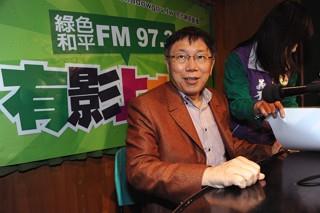Future Public Housing to See Boost in Social Welfare Resources
Mayor Ko Wen-je promised to incorporate social welfare facilities into the blueprint of future public housing estates during an interview on Green Peace Broadcasting Station on March 14.
According to the mayor, there are three stages to implementing Taipei’s public housing policy: The first phase is to free up unoccupied residential properties owned by the City and make them available to tenants. The next step is to build one interim housing estate in each of Taipei’s 12 administrative districts. The last part involves selecting 22 properties for city-sponsored urban renewal projects and constructing affordable public housing units.
Ko also made a case for the provision of social welfare amenities in public residential complexes such as child care and senior nursing services. Acknowledging the fact that Taipei is becoming an aged society, he stressed it is imperative for the private sector to be involved in care-giving services to ensure sustainability. Social enterprise, community empowerment, and volunteerism should be the solutions to the demographic challenge, he noted.
When asked by the media about recent controversies over the City’s public housing measures, the mayor stated that a communication mechanism will be established in two weeks to better promote city policies to residents in the neighborhood. Citing the remodeling plans for Zhongzheng Bridge as an example, he pointed out that major policies in the future will be published online before taking effect.
On the possibility of imposing heavier taxes on owners of vacant apartments to free up more dwelling units, Ko pointed out that the property tax cannot be adjusted until 2017 as law allows for a review of the tax only once every three years.


![Taiwan.gov.tw [ open a new window]](/images/egov.png)
